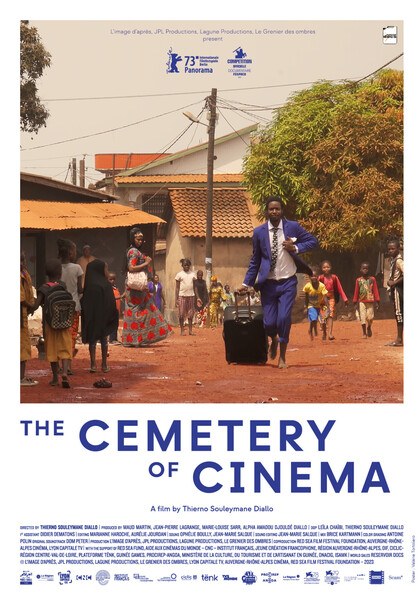
Dokument Thierno Souleymane Diallo zabiera widza w podróż śladami dawnej – i niemal zapomnianej – historii kina w Gwinei. To osobista wyprawa przez opuszczone kina, zaniedbane archiwa filmowe, a także zabytkowe miejsca związane z projekcją i produkcją filmów. Celem jest odnalezienie kopii filmu Mouramani (1953) – uważanego za jeden z pierwszych filmów wyreżyserowanych przez afrykańskiego reżysera francuskojęzycznego, Mamadou Touré. Dzieło Diallo doskonale miesza porażające zdjęcia, absurdystyczny humor z momentami zadumy na przeszłością i przyszłością kina nie tylko w Afryce, ale na całym świecie.
urodził się w 1983 roku w Pita, w środkowej Gwinei. Studiował w Instytucie Sztuk Pięknych w Dubréce (ISAG). W 2012 roku przeniósł się do Nigru, aby studiować dokumentalistykę, a następnie uzyskał dyplom w Senegalu. Jest również założycielem własnej wytwórni filmowej. Jego twórczość inspirowana jest filmami Abderrahmane’a Sissako, Souleymane’a Cissé i Cheick Fantamady Camary.
Filmy z jego filmografi to Un homme pour ma famille (2015) – krótkometrażowy dokument; Nô mëtî sîfâdhe (2018) – średniometrażowy dokument; Au cimetière de la pellikule (2023) – pełnometrażowy dokument, znany międzynarodowo jako The Cemetery of Cinema. Jest to film drogi, który dokumentuje poszukiwania przez Diallo zaginionego filmu Mouramani z 1953 roku, uważanego za pierwszy film stworzony przez czarnoskórego reżysera z Afryki francuskojęzycznej. Diallo przemierza Gwineę i Francję w poszukiwaniu kopii tego filmu, jednocześnie badając historię kina w swoim kraju. Film miał swoją premierę na Berlinale w 2023 roku i został zaprezentowany na wielu międzynarodowych festiwalach filmowych.
Film Au cimetière de la pellicule zdobył uznanie na międzynarodowych festiwalach filmowych, w tym na Berlinale, FESPACO i innych.
The documentary by Thierno Souleymane Diallo (2023) takes the viewer on a journey through the traces of the former – and almost forgotten – history of cinema in Guinea. It is a personal voyage through abandoned movie theaters, neglected film archives, and historic sites connected to film projection and production. The filmmaker’s goal is to find a copy of Mouramani (1953), considered one of the first films directed by a French-speaking African filmmaker, Mamadou Touré. Diallo's work perfectly blends striking images and absurd humour with moments of reflection on the past and future of cinema, not only in Africa but throughout the world.
was born in 1983 in Pita, central Guinea. He studied at the Institute of Fine Arts in Dubréka (ISAG). In 2012, he moved to Niger to study documentary filmmaking, and then obtained a degree in Senegal. He is also the founder of his own film production company. His work is inspired by the films of Abderrahmane Sissako, Souleymane Cissé, and Cheick Fantamady Camara.
His filmography includes Un homme pour ma famille (2015) – a short documentary; Nô mëtî sîfâdhe (2018) – a medium-length documentary; Au cimetière de la pellikule (2023) – a feature-length documentary, known internationally as The Cemetery of Cinema. It is a road movie that documents Diallo's search for the lost 1953 film Mouramani, considered the first film made by a black director from French-speaking Africa. Diallo travels across Guinea and France in search of a copy of the film, while also exploring the history of cinema in his country. The film premiered at the Berlinale in 2023 and has been screened at numerous international film festivals.
Au cimetière de la pellicule has won acclaim at international film festivals, including the Berlinale, FESPACO, and others.